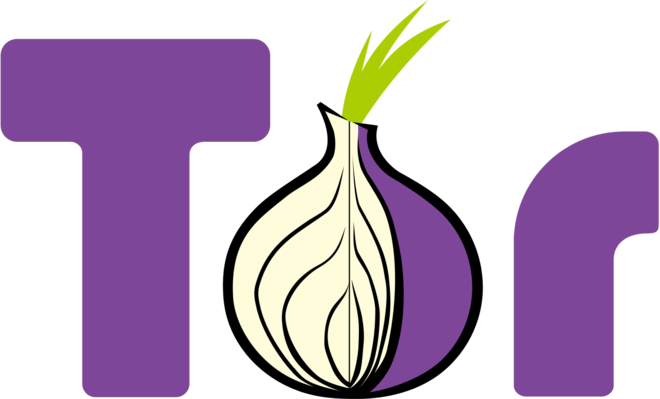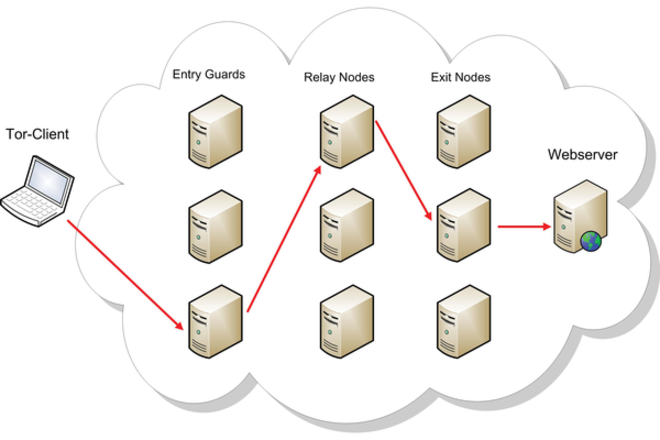Whenever we surf the web, we leave traces that not only help Google but also every site we visit learn a lot about us. Whether it's cookies, IP address analysis, the referrer URL (the site we visited before) or the powerful Google Analytics, we're constantly being watched. Anyone who disagrees is forced to resort to measures that may require lots of technical expertise. The Tor network is the easy solution. Read on to learn about its advantages and risks.

The power of the onion
Tor stands for "The onion routing" and this provides a first clue as to the way it works. Like an onion that has multiple layers, surfing through Tor involves redirecting your traffic through various (usually three) Tor servers with encryption being used throughout the process. This makes it already a lot harder to trace your steps but on top of that, the set of servers used to relay your traffic gets switched every 10 minutes. If you then visit a site that accesses your IP address such as www.whatsmyip.org, you'll see the address of the most recent relay server while your machine's address will stay anonymous.
Complicated technology, easy handling
Using Tor is not a challenge. Windows users simply install the Tor application that comes bundled with a specially prepared Firefox. At launch, your prompted to confirm that you would like to access the Tor network and you'll then have to wait a few seconds before the connection is established and you can start browsing. If you're behind a proxy or another type of restricted access (unfortunately common place in a few countries) you'll be able to configure that also. After that, you'll be good to go and greeted by a page with a few tips and tricks.
 Anonymous through 3 servers
Anonymous through 3 servers
Browsing with Tor
One thing you'll notice right away: You won't be breaking any speed records with Tor. If you intend on watching, say, Youtube in high resolution, you'll be in for a lot of lag like in the old days. Traffic is routed through multiple servers, after all, and there's a lot of encryption involved, the price you must pay for anonymity. And while we're on the subject - everything feels different. Depending on the country the last server is located in you may see some sites in that language, i.e. French during my test runs. For security reasons, Flash is deactivated, Google is out of the question and has been replaced with DuckDuckGo. Amazon suddenly no longer remembers me and Facebook is trying to win me over as a new user - same old, same old!
The Tor browser
Mozilla Firefox has been extended to automatically connect to Tor and fitted with a couple of new security settings. With a single click you can now disable script execution entirely, assume a new identity (reconnects and wipes all browser user data) or adjust the level of security from low (good enough for most users) to high (practically everything is locked, blocked or disabled).
Anonymity vs. intelligence services
As you might have guessed, secret service members aren't the biggest fans of Tor. Quite the opposite, Tor users are often under general suspicion of using the software to hide illegal activities. Indeed, criminals are also using the network - but so do members of the political opposition all over the world and ordinary users like us that try to protect their privacy. This is why governments from various countries are regularly at loggerheads with Tor and other anonymity projects either restricting or trying to prevent access altogether.
 Always listening: secret services around the world
Always listening: secret services around the world
Total anonymity?
The degree of anonymity achieved through Tor is subject to heavy debate but you can certainly use it to spoil the idea of transparent web users (a dream harbored by Google and other big players). You can get away from the huge advertising and personalization industry but if the secret service was really after you, I wouldn't bet on the safety of Tor. The collaboration of various countries that host the majority of Tor servers furthermore threatens anonymity.
Need more Tor?
Naturally, Tor isn't exclusive to Windows systems and goes beyond simple web browsing. There's a messenger that employs maximum encryption for receiving and sending messages and Android users can rely on Orbot to access the Tor network and Orweb to browse its contents. Users of iOS 5.1 and higher may access Tor through the Onion Browser and there's multiple packages available for OS X and Linux users.
What I would like to know: How useful is anonymization to you and do you already use Tor, Anonymizer or similar tools? Would you be willing to give up the comfort of cookies and Google to protect your privacy?
Pic 1: Wikipedia; Pic 2: Ubuntuusers.com
Download: https://www.torproject.org/download/download-easy.html.en




My greetings to you Sven; am cheerfully sending the comment for blogging has it's uplifting moments here where am currently staying. A "perfect" human here under the heavens on this green earth makes an effort to know and try to understand. Knowing is believing in; even if not agreeing in time to diffuse the situation created by an incident. So, armed with the knowledge that safety/security at the end of the day, certainly is/or is an amiable goal life free of cares has pitfalls. If my personal philosophy gets under someone's radar causing them psychological distress certainly there will follow repercussions; yes, and pay-in-full. Today, at this present time.
Zuckerberg put facehound on the darknet months ago. Meganet, and unused 4g bandwidth are the future not nodes and dark fiber. These guys own the system, the only thing left is to share the expensive 4g leftover monthly bandwidth we are all terrified to use and our cellphones running as darknet nodes. The internet then becomes a giant torrent of IMEI nodes we carry around all day. Bet on Kim Dotcom, hes nuts smarter then the NSA, pissed about XKeyscore and about to make Snowden look like Adrian Lamo. Google still gets to run the add money if you want Gapps though, so...
I can accesss a social network saveNaturefree and log in when using the tor browser but not with firefox or chrome? What is going on here?
Will this work with sites like Hula? I'm outside the US and can't access Hula and some other sites that sound great. I can't even watch many of the items on the BBC because they have agreements with broadcasters in my country. So if a local broadcaster puts on a documentary and I miss it and discover it say 5 years later on the BBC I can't watch it. Seems stupid as the local broadcaster is never going to air it again.
I'm even willing to put up with lag to watch some of those fascinating documentary's.
It should also work with sites such as Hulu as long as you are directed through the correct exit node. Keep in mind that the connection is fairly slow.
Since you cannot directly influence the location of the Tor servers you’ll be using, a proxy or VPN server in a country that is not affected by Hulus geoblocking
may be a better choice in this case.
Tor is too slow, and as a 'techie' I have checked many so-called 'best' VPN's and one stands out above the rest, ExpressVPN, the most expensive at US$12.00 per month.
Many of the cheaper versions are slow and do not work well in Australia.
ExpressVPN also has many extras lacking in other versions, many more countries available, and several servers in some countries, USA, UK etc;
I think of John Ruskin when looking at products I wish to purchase, "The Common Law Of Business Practice"
http://www.goodreads.com/quotes/236559-it-s-unwise-to-pay-too-much-but-it-s-worse-to
I already give up cookies and more to protect myself, never use a real name dob address vary punctuation spelling clean often change ip
Kiss the days of "privacy" goodbye, with all the violations of privacy that the various governments commit the idea of privacy is now moot. VPNs, TOR, and the other services/programs that offer us a little bit of privacy control are really just a temporary stop-gap to the ongoing incursion into our private lives.
Unless you have something that you really need to hide, I reckon the wish to frustrate the data-gatherers is just a bit of sport - the little man having a bit of fun at the big corporations' expense! After all, what do they really do with the information they gather about you, other than throwing "relevant" ads at you? It all seems fairly innocuous to me.
Speaking of "relevant" ads, it's always seemed entirely pointless that, whenever I buy something from one of the major online retailers (which I do fairly often), I am subsequently targeted with ads for that item - yes, the item that I have already bought!
What does Carl Gustav Jung have to do with this thread? He is a psychiatrist????
Synchronicity was one of his main research topics! One of the great thinkers.
I use a proxy/VPN service to watch BBC UK programmes and other film streaming providers' output since I live outside the UK. All traffic is encrypted.
At the moment TOR would just slow me down and possibly I might be inviting all sorts of unknown "visitors".
I understand that file sharing now needs TOR. The days of easy access to "pirated" to music etc are gone for good now "big brother" has driven things underground.
Well this is syncronicity. I just recieved this email. Hide Your IP Address, Browse the Web Securely, Access Blocked Content & More without Slowing Down Your Browser https://deals.x-mirage.com/sales/lifetime-elite-hotspot-shield-vpn
Carl Gustav Jung still rules. :)
Cyberghost is the best free VPN and if you want more options they have a paid version but wait till around black friday when they have subscription sales.
Alright, I'll write an article about VPN as well. :)
Obviously I am interested in anonymity, but if this TOR will bother “Very Curious People”, I think Tor or Mozilla Firefox for Tor will disappear, or will suffer great malfunction.
"For security reasons, Flash is deactivated, Google is out of the question and has been replaced with DuckDuckGo." I was referring to that particular phrase.
DuckDuckGo promises to search the web anonymously without collecting data about their users. It’s a minor risk but nowhere nearly as risky as the data hungry giant that is Google.
What I would like to know is whether you have tried Ultrasurf, also free, which does more or less the same for me, that is, access to forbidden sites for my work. Both have speed problems too. From where I'm sitting right now, I use Tor to access GMail. By your blog of today, should I understand that it's a contradiction?
I hadn’t heard of Ultrasurf until now but I’ll make sure to take a look at it!
What kind of contradiction would that be?
NO! It's a bad thing, all it does is protect the criminals!---maybe?
To some, anyone who values privacy is a potential criminal. ;)
Today it is hard to identify where more criminals. It's up to the TOR network or legally secret services ?